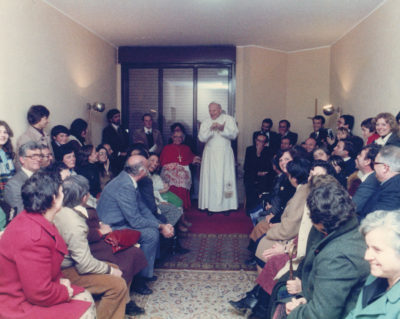Visit to the parish of Saint John the Evangelist of Spinaceto 11-18-1979
St. John Paul II
Rome, November 18, 1979 *
The Holy Father’s conversation with the representatives of the Neocatechumenal groups who following their way of faith with the people of Spinaceto was particularly deep. Here, too, at Saint John the Evangelist as in the parish of Saint Luke, which the Holy Father visited two Sundays ago, it was the Neocatechumens from the parish of Canadian Martyrs who introduced the Way of faith. A family of itinerant catechists: Giampiero Donnini with his wife Ana and daughter Débora, have come to Spinaceto to help this community, still walking, to explore its way to being Christians. Giampiero spoke to the Pope yesterday afternoon, on behalf of everyone: “Holy Father,” he exclaimed, “we are truly happy and thank the Lord for your presence here, because these communities, which have been walking in the parish since 1974, are opening a way of evangelization within the interior of the parish, something you spoke about in your apostolic exhortation ‘Catechesi Tradendae.’ They are doing a double service, within the parish, so that the parish can renew itself, to begin to welcome people who are far away from the Church; to welcome above all the atheists, the Marxists, the drug addicts, people who are, as you have said this evening in your homily, desperate, empty, for whom life has no sense. Father, we are discovering a wonderful thing: that Jesus Christ is alive and that he is risen! And that Jesus Christ risen and alive, is in his Church, with the power to overcome death in us. We are seeing, Father, for example, starting from our own marriages, that God has truly rebuilt them from nothing. We were divided and the Lord has made us understand that conversion, as you have reminded the Cardinals in your recent speech, is the fundamental work of the Church today: conversion in the light of the Second Vatican Council. We are working in this direction, Father, in this parish. We are helping the parish priest who called us in 1974, not looking for a movement but to serve the parish so that it would be prepared to welcome the faraway people, the people who have no more hope, and who are asking what is the meaning of their lives. In this way, they are given the opportunity to rediscover their Baptism, to see that baptism is not only something written down in the register, but that it is the power of God who is regenerating us to a new life, to the life of sons, as you have said so many times.
Father, the document you have published is a great joy for us. It really seemed like a gift of the Holy Spirit. So much so that our catechists have thought to ask for an audience here in Rome for the 5,000 catechists of adults (800 from their diocese) who are carrying on in the parishes this renewal. So that the echo of this document can reach the pastors and does not end up lost. Another thing, Father. We find ourselves, as you say in the document, giving a very important service. The Diocese of Rome (we thank the Cardinal Vicar) is actually carrying out this renewal. God has inspired some itinerant vocations and there are more than 100 people, including married couples with children, also priests, young men and women, who are devoting their lives to the Gospel throughout the world to help parishes in this renewal. Today the liturgy is very important as a moment of catechesis, of evangelization – for without the liturgy, evangelization is dead and the community does not grow. How can the Church grow without the Eucharist? How can the Church grow if there is not a moment when we can come before Jesus Christ, and make Passover with Him, experiencing that he comes to take us from our situation of death and sin, and bring us to the Father? That’s why we need, Father, we need a special audience with you, if you grant one to us, to submit to you this experience of evangelization, to share with you the joy and also the problems that we inevitably experience, because it is most important for us to be in communion with you and to have your blessing.”
After having thanked Giampiero, the Holy Father wished to give emphasis to the great spiritual and evangelical content of the work being carried out in this direction in the parish.

“I must tell you that here is a man from the Osservatore Romano who has written everything you have said and now he will write everything I say … and then they will publish one piece of the two and I think that if they publish everything it will even be successful, a success, because what you said is fair, is good, is evangelical and consoles all of us, consoles me because they show that the Church in your parish and also in the whole city of Rome, the Roman Church, by means of your communities, is a living Church. It is not only an administrative reality, even with very great traditions, but is a living reality. This living reality is made up of each one of us when enlightened by the grace of faith. Faith- so many have faith. I think that there are few in the world who have no faith at all. They always have something. But there are degrees in the intensity of faith, of its roots in our personality. So we need to make sure that these roots of our faith, of our personality, of our conscience, of our soul, are always deeper. In this way faith, built in each one of us, strong in each one of us, so aware, so personal, becomes apostolic. I think that this is the vital sense of your Neocatechumenal Communities.
The name is beautiful, too: Neocatechumenal, Neocatechumenal Communities. Because the name reminds me of the catechumens in the past who once prepared for Baptism over a long period of time, for months, even years, especially during Lent and then, so prepared, they received Baptism with great fervor, with great joy. This was the traditions of ‘domenica in albis’, white Sunday, when they wore the catechumenal robes. Nowadays, in a certain sense, we lack this, because Christians are baptized as little children, when they are two weeks or a month old. We miss a little that institution of the early Church, that preparation that makes us live Baptism. Baptism becomes something that is done, not something that is matured. So the Neocatechumenal Communities seek to complement, to complete, what we lack. Mature men and women like you go back towards the moment of their Baptism, to re-live this again, to prepare again what already exists in everyone of us. We are baptized, the reality of Baptism exists in every one of us, but we need to see again what Baptism is, its true dimension, its supernatural, divine, sacramental dimension, with all its richness, with all its consequences. I think this is a good way to do it. Furthermore, you do this, you live this, in the communities.

It is not a process that takes place in solitude, it is a process of the community, a process that takes place together. You live the joy of rediscovering Baptism, its true meaning, its true reality: together, you do it together! And so the spirit that animates everyone of us, transmits itself to the others, and there is a sharing of experiences, a sharing of enthusiasm and joy. This expresses itself in the prayer too, this expresses itself in the songs. Then, certainly for a parish, such a community, such a group, is undoubtedly leaven; for, as you have said, there really are so many people who have come from far, but there are also many whose lives were far away, living in the different ideologies, living with different preoccupations.
These people need others who, aware of the significance of Baptism, live beside them to bring them to understand. They are baptized too, the great majority of them. But once baptized, that Baptism becomes more or less dead. Others are needed, co-parishioners, to come and bring that Baptism to life in their friends, in their neighbors. Then this really is leaven. And the leaven must ferment the dough, as Christ says in the Gospel. All right, we think you can write our entire speech…write it in the Osservatore Romano. Well, a blessing with all my heart: to each one of you, to your families and your communities.
(*) Cfr. «L’Osservatore Romano», 19-20 November 1979.